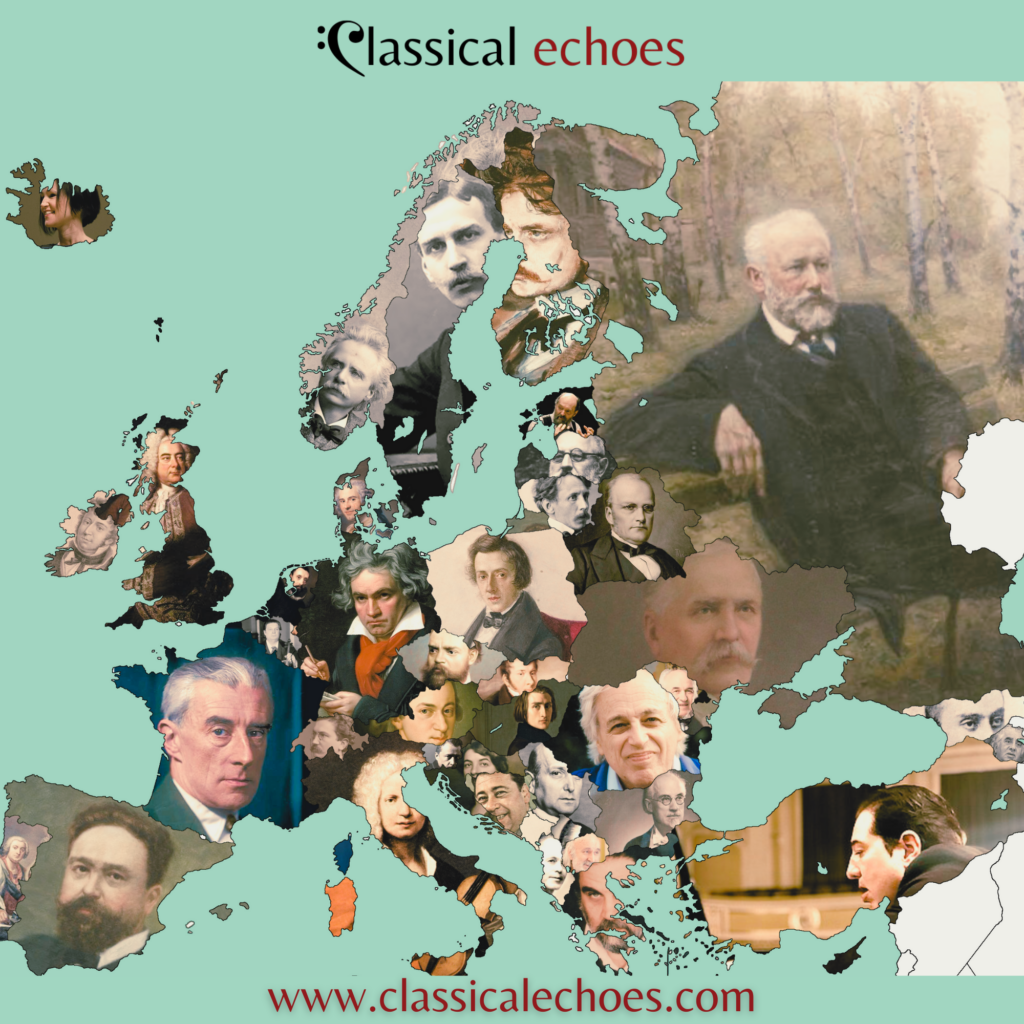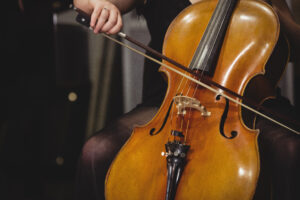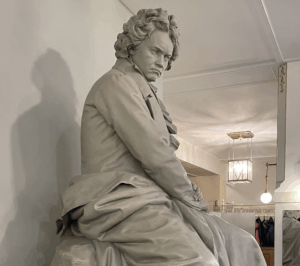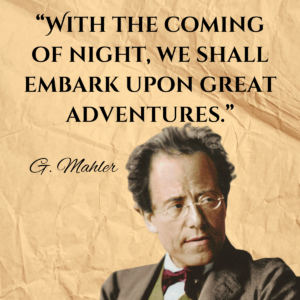Albania – Simon Gjoni (1925 – 1991)
S. Gjoni was a popular Albanian composer, pianist, and conductor of the 20th century. He was one of the most prolific and wide-ranging Albanian composers, writing pieces for piano, orchestra, and songs. He was a highly regarded conductor and worked all across Europe, shaping Albanian national classical music.
Austria – W. A. Mozart (1756–1791)
Wolfgang Amadeus Mozart, probably the most famous Austrian ever, was born in Salzburg, Austria. He became the most renowned musician of his time across Europe and, along with Haydn and Beethoven, established Vienna as the musical capital of the world. Known for his perfectionism in music, Mozart wrote various symphonies and piano sonatas, making him one of the most beloved composers in history.
Armenia – Aram Khachaturian (1903 – 1978)
A. Khachaturian is probably one of the most famous Soviet composers. Born in Armenia and influenced by Caucasian culture and folk music, he graduated from a conservatory without prior musical training. Unlike many talented people of that time, he stayed in the Soviet Union and is still recognized worldwide for his famous ballets and orchestral suites.
Belarus – Stanisław Moniuszko (1819 – 1872)
S. Moniuszko is one of the most well-known Belarusian-born Polish composers of the Romantic era. He is the author of numerous operas and songs and had a significant impact on the culture and art of the Polish-Lithuanian Commonwealth. In Belarus, he is recognized as one of the key figures in their musical culture.
Belgium – Eugène Ysaÿe (1858 – 1931)
E. Ysaÿe was a Belgian composer and violinist, famous for his extraordinary musical skills and definitive musical style. He is regarded as one of the greatest violin virtuosos in history, and much of his music is written for this instrument. He used various techniques of modern classical music, and some of his works are extremely difficult to perform but are very beautiful in nature, such as his Ballades for Violin Solo.
Bosnia – Rade Jovanović (1928–1986)
Rade Jovanović was a Yugoslavian composer and musician known for his Bosnian songs. Although primarily a songwriter rather than a classical composer, he remains a key figure in Bosnian musical heritage.
Bulgaria – Dobri Hristov (1875–1941)
Dobri Hristov was one of the most important Bulgarian composers, known for his usage of Bulgarian cultural heritage in his music. A graduate of the Prague Conservatory under A. Dvořák, he wrote many choral and orchestral work, essential for Bulgarian classical music.
Croatia – Dora Pejačević (1885–1923)
Dora Pejačević was one of the first Croatian composers to lead the development of classical music in the country. One of the few female composers in Europe, she wrote in a late modern style and left a lasting impact on Croatian music.
Czech Republic – Antonín Dvořák (1841 – 1904)
A. Dvořák is one of the most famous Eastern European composers of all time. A Bohemian (now Czech Republic) composer and pianist, he was regarded as one of the most beloved composers for his melodic and gentle tunes. Like Smetana, Dvořák used elements of Slavic culture and folklore in his music, such as his famous Slavonic Dances, which depict an uncanny and mysterious tone.
Denmark – Dietrich Buxtehude (1637 – 1707)
D. Buxtehude was a Danish Baroque composer and organist, regarded as one of the greatest organists in Germany. He had a significant influence on young Bach and Handel and wrote in many musical forms, mostly for organ. Though many of his works are permanently lost, many pieces remain.
Estonia – Arvo Pärt (born 1935)
Arvo Pärt is an Estonian modern composer known for his minimalist musical style and inspiration from Gregorian chants. He is one of the most important neo-classical composers of our time, recognized for his “holy minimalism” and spiritual meaning of his music.
Finland – Jean Sibelius (1865–1957)
Jean Sibelius was a Finnish composer of the Romantic era who significantly influenced Finnish classical music. He was one of the most successful composers in Europe, writing numerous orchestral and solo works. Sibelius fought against the Russification of Finnish culture, dedicating many of his masterpieces, such as Finlandia and the Karelia Suite, to his country.
France – Maurice Ravel (1875 – 1937)
M. Ravel was a French composer of the late Romantic and early 20th-century period, a leading impressionist and modernist, although he rejected this. He is famous for his piano works, orchestral music, and ballets. He is considered to be one of the greatest orchestrators and one of the most complex composers.
Georgia – Zacharia Paliashvili (1871 – 1933)
Z. Paliashvili was a founder of Georgian classical music and the Georgian National Philharmonic. Influenced by Georgian folk songs and romantic melodies, his music is included in Georgian national anthem. Despite working and gaining fame in Moscow, he dedicated his life to the rise of Georgian national culture and music.
Germany – Ludwig van Beethoven (1770–1827)
Ludwig van Beethoven, probably the greatest composer of all time, was born in Bonn, Germany, in 1770. He started a new direction in classical music. Unlike classical composers such as Mozart and Haydn, Beethoven incorporated more self-expression and drama into his music, making him one of the first composers to define the Romantic era in music and art in general.
Greece – Vangelis (1933 – 2022)
Evangelos Odysseas Papathanassiou, better known as Vangelis, was a modern Greek composer and musician. He was a famous producer of modern classical instrumental music and one of the most famous composers of modern times, writing movie soundtracks like Blade Runner. He is famous for his epic and colossal sound, an echo of Greek ancient legends, like in his most famous pieces such as Conquest of Paradise.
Hungary – Franz Liszt (1811 – 1886)
F. Liszt was an Austro-Hungarian composer and piano virtuoso. He is probably the most famous pianist who ever lived and a key figure in the development of Romantic classical music in Europe and the world. He wrote numerous piano pieces, including études, rhapsodies, transcriptions of Beethoven’s symphonies, and one of the greatest piano sonatas. He was also a skilled orchestrator and founded his musical style, the symphonic poem.
Iceland – Anna S. Þorvaldsdóttir (born 1977)
A. Þorvaldsdóttir is a modern Icelandic composer and songwriter, regarded as one of the most important figures in Icelandic music by the Nordic Council Music Prize. She actively writes in the neo-classical style and has composed various chamber and choral works, string quartets, and songs. She is one of the most significant instrumental composers of today.
Ireland – John Field (1782 – 1837)
J. Field was an Irish composer of the late Classical and early Romantic periods, who became famous across Europe and had a significant impact on classical music. Born into a musical family, he was passionate about music and gained recognition from other musicians. He was the first composer to define the nocturne as a separate musical style, making it a popular among other composers.
Italy – Antonio Vivaldi (1678 – 1741)
A. Vivaldi was an Italian composer and violinist, one of the most influential musicians ever. He is the author of the most famous Baroque composition, The Four Seasons, and the greatest representative of the Italian musical school. His music is described as “metallic and wild,” and he was an equivalent of a rock star, contrasting with the more reserved German School composers like Bach and Handel.
Latvia – Jāzeps Vītols (1863–1948)
Jāzeps Vītols, a Latvian composer and musicologist, is considered one of the founders of Latvian classical music. Inspired by Russian Romantic composers, he wrote in the Romantic style and also worked as a teacher, pianist, and head of the Latvian Opera.
Lithuania – Mikalojus Konstantinas Čiurlionis (1875 – 1911)
M. Čiurlionis was a Lithuanian composer, choirmaster, and painter of the late 19th century. Despite being a wider cultural figure in Lithuanian history, he is most well known primarily as a composer. His works number more than 400, including symphonies and songs based on Lithuanian folk themes.
Moldova – Eugen Doga (born 1937)
Eugen Doga is a Moldovan composer who composes in different musical styles. One of the most recognizable composers today, he has written over 100 symphonies and orchestral works, including the famous Gramophone Waltz. Along with A. Rubinstein, he is a key figure in Moldovan music.
Sweden – Wilhelm Stenhammar (1871–1927)
Wilhelm Stenhammar was a Swedish composer and performer who wrote mostly for orchestra and piano. Born into a wealthy Stockholm family, he studied in Berlin and was influenced by late Romantic German composers such as Brahms. His works include four piano sonatas, two symphonies, and numerous songs.
Netherlands – Jan Pieterszoon Sweelinck (1562 – 1621)
J. Sweelinck was a Dutch composer, organist, and pedagogue of the late Renaissance and early Baroque eras. He was known as the “Orpheus of Amsterdam” and contributed significantly to keyboard music, especially in the development of the North German organ school.
North Macedonia – Ilija Pejovski (born 1947)
I. Pejovski is a modern Macedonian composer who focuses on jazz and was the first in his country to treat jazz professionally. He actively composes for piano and, besides jazz pieces, also writes for orchestra and film music.
Ukraine – Mykola Lysenko (1842–1912)
Mykola Lysenko, along with S. Prokofiev and Leontovych, is one of the key figures in Ukrainian music. Inspired by Ukrainian folk culture, his works are based on folk motifs. He composed many operas and set novels, such as Gogol’s Taras Bulba, to music. Lysenko was one of the few composers of his time who resisted Russian influence in music, focusing on his own style.
Poland – Frédéric Chopin (1810 – 1849)
F. Chopin was a Polish composer and pianist, a leading musician of his generation in Europe. Since childhood, he was a prodigy and had significant composing skills. Being friends with leading European musicians, Chopin wrote primarily for piano, which he mastered. He is the author of many famous tunes in classical music, including perhaps the most famous set of piano pieces, his Nocturnes.
Norway – Edward Grieg (1843 – 1907)
E. Grieg was the most famous Scandinavian composer of all time, renowned for his usage of Norwegian and Scandinavian folklore. Born in Norway, he became famous across Europe for the particular quality and sound of his music, wonderfully picturing and expressing nature through his compositions. He is the author of one of the most famous piano concertos and the Peer Gynt suite.
Portugal – José António Carlos de Seixas (1704 – 1742)
J. de Seixas was a Portuguese composer, conductor, and organ virtuoso of the early Baroque era. He was one of the most important South European composers of his time, writing in many different musical styles, primarily for organ and keyboards. He was famous as a performer, often improvising in his concerts.
Romania – György Ligeti (1923–2006)
György Ligeti, a Romanian-born Hungarian composer and musicologist, is regarded as one of the leading avant-garde composers of the 20th century. He wrote experimental music and settings of folk songs. Like John Cage, Ligeti was known for his experimental and innovative compositions.
Russia – Pyotr Tchaikovsky (1840 – 1893)
P. Tchaikovsky is the most famous Russian composer, renowned for his development of Russian ballet as well as purely musical orchestral works, piano and violin concertos, symphonies, and musical settings. His music is described as sentimental and heartfelt.
Serbia – Stevan Hristić (1885–1958)
Stevan Hristić was a Serbian composer of the late Romantic period and one of the most famous Serbian musicians. His works include large-scale orchestral pieces, oratorios, operas, and ballets. He studied and taught music in different European capitals but spent most of his career in Belgrade.
Slovenia – Hugo Wolf (1860–1903)
Hugo Wolf, an Austro-Slovenian composer, combined the styles of early Romantic composers. Influenced by Wagner and Schubert, he was famous for his songs and short melodic pieces.
Spain – Isaac Albéniz (1860–1909)
Isaac Albéniz was a Spanish virtuoso pianist, conductor, and composer who significantly influenced Spanish classical music. Many of his works, based on Spanish folk motifs, were later transcribed for classical guitar, although he never wrote for this instrument.
Switzerland – Hans Huber (1852 – 1921)
Hans Huber was a Swiss composer of the late Romantic period and one of the most famous Swiss musicians. His works include several operas, sets of preludes and fugues, and various piano compositions. His musical style was influenced by the conservative Brahms and the late works of Beethoven and Schubert.
Slovakia – Johann Nepomuk Hummel (1778 – 1837)
J. Hummel was a Slovakian-born Austro-Hungarian composer and virtuoso pianist. He was a pupil of Mozart and Salieri, who had a significant impact on him, later making him one of the key figures in the transition between the Classical and Romantic eras. He was famous in Vienna as a piano virtuoso of his time, writing for piano, including his famous piano concerto in A minor.
Turkey – Fazil Say (born 1970)
F. Say is a famous Turkish pianist and performer, known for his artistic and virtuosic piano skills. Even though he is more famous as a performer, he is also an active composer. Despite Turkish Islamic culture not developing music in the same way as in Europe, Fazil Say is famous for his numerous orchestral and choral works with a Turkish charm, making them particularly interesting.
United Kingdom – Georg Friedrich Handel (1685 – 1759)
G. F. Handel was a German-born Baroque composer who spent most of his career in England. Together with Bach, he is one of the most influential Baroque composers. He is best known for his operas, oratorios, and concertos.
Related
• Composers Before Bach: 7 Great Composers of the Past
• F. Schubert: Sonata no. 21 – A Complete Guide and Overview






